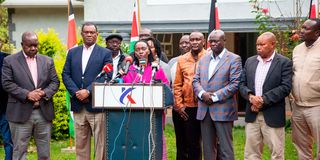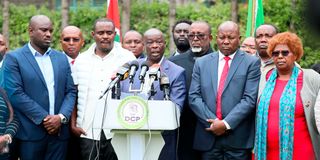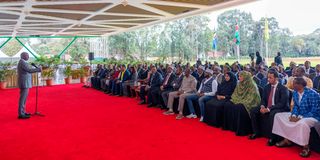
People’s Liberation Party leader Martha Karua(Centre) addresses journalists flanked by (from left) Dr Fred Matiangi, former Attorney-General Justin Muturi, former Deputy President Rigathi Gachagua and other opposition leaders at SKM Command Center in Nairobi on July 8, 2025.
Opposition leaders have launched a new wave of political resistance that mirrors ODM leader Raila Odinga’s historic playbook, in a bid to push back against President William Ruto’s Kenya Kwanza administration.
Dubbed the United Opposition, the alliance brings together at least six political parties: former Deputy President Rigathi Gachagua’s Democracy for the Citizens Party (DCP), Kalonzo Musyoka’s Wiper, Martha Karua’s People’s Liberation Party (PLP), Eugene Wamalwa’s Democratic Action Party (DAP-K), the Democratic Party (DP) under Justin Muturi, and former President Uhuru Kenyatta’s Jubilee Party, represented by national chairman Torome Saitoti, alongside former Interior Cabinet Secretary Fred Matiang’i.
The group is now reviving confrontational tactics once associated with Mr Odinga—boycotts, civil disobedience, protests, international lobbying, legal action, frequent press briefings, and public forums to privately prosecute perpetrators of state violence. This resurgent band of leaders has embraced the full spectrum of resistance tools popularised by Mr Odinga, intensifying efforts to delegitimise President Ruto’s regime. From street protests to economic boycotts, the Gachagua-Kalonzo-led coalition appears to be following a well-worn script of political defiance.
Crimes against humanity
In a fiery address on Wednesday, Mr Gachagua said the opposition would contact the International Criminal Court (ICC) over what it describes as crimes against humanity committed during recent protests. “We will be writing to the ICC and other international institutions to document these atrocities. This regime has turned against its own people,” he said—echoing a tactic Mr Odinga used during violent state crackdowns in the past.
The opposition’s plan includes calls for mass protests and non-cooperation with state institutions—hallmarks of Mr Odinga’s strategy. Already, demonstrations have rocked towns across Mt Kenya, Nairobi, and other regions, as the opposition urges Kenyans to peacefully resist what they describe as illegitimate rule. “We, the united opposition, in solidarity with all progressive forces, declare that enough is enough. 2027 is too far. We cannot allow another day of unchecked killings, another week of a security system resembling colonial repression,” Dr Mukhisa Kituyi said on Tuesday on behalf of the alliance.
But in a sharp rebuttal, President Ruto charged on Wednesday: “They have said they won’t wait for 2027 to vote. That they plan violence to overthrow the Government. I dare them to try. This is a democratic country—you cannot plot to overthrow the Government.” His statement was followed by warnings from government allies, who accused the opposition of inciting unrest and attempting to destabilise the country through illegal means. They argued that the Constitution provides legal mechanisms for transition of power and condemned any extra-constitutional tactics.
The opposition is also reviving Mr Odinga’s signature tactic of strategic boycotts. Mr Gachagua and his allies announced plans to publish a “list of shame” targeting businesses allegedly benefiting from regime favouritism. “We will withdraw our purchasing power from these enablers,” said Dr Kituyi. The list, expected to be crowdsourced, will invite citizens to submit names of companies perceived to support the Kenya Kwanza regime. Critics of the move warn that such boycotts may heighten tensions and hurt ordinary workers, while proponents argue they are a legitimate form of economic resistance.

Democracy for the Citizens Party leader Rigathi Gachagua (center) addressing journalists at his home in Karen, Nairobi, on July 9, 2025.
This approach closely mirrors Odinga’s 2018 National Resistance Movement (NRM), which targeted Safaricom, Brookside, and other major firms seen to support President Uhuru Kenyatta’s regime. Then, as now, Kenya Kwanza allies labelled it economic sabotage. National Assembly Majority Leader Kimani Ichung’wah called the new boycott “reckless and damaging,” and likened it to the looting seen during recent protests. “They want to collapse the economy to gain power. That’s not leadership—it’s destruction,” he said. However, the opposition maintains that it is the Ruto administration’s harsh taxation, impunity, and police brutality that are threatening national stability.
Beyond local efforts, the United Opposition is seeking global intervention. Diaspora forums have already been launched in the UK and US, with envoys including Dr Matiang’i engaging international civil society groups and human rights organisations. Mr Gachagua is expected to travel to Washington, DC, for meetings with policymakers, the Kenyan diaspora, and multilateral institutions. This mirrors Mr Odinga’s past lobbying efforts, including his appeals to the UN, African Union, and US State Department during post-election periods. The strategy is to elevate domestic issues to international platforms—framing Kenya’s governance crisis as a global concern.
The opposition has also launched the People’s Restoration Justice Commission (PRJC), which it says will document human rights abuses and state violence. Through this commission, leaders hope to privately prosecute state officials implicated in police killings and abuses during recent demonstrations. Evidence collected will also be submitted to the Director of Public Prosecutions (DPP) and international human rights bodies. “We will not rest until justice is served,” said Martha Karua. “The regime has crossed a line—now we respond with facts, names, and legal action.”

President William Ruto hosts United Democratic Movement party officials at State House Nairobi on July 9, 2025.
But internal divisions and public scepticism may challenge the alliance. Analysts point out that while the opposition’s energy resembles Odinga’s past campaigns, its ideological coherence remains unclear. Political analyst Javas Bigambo said, “What we are seeing is not a united vision—it’s a shared anger. Without a forward-looking policy agenda, it risks becoming a union of vengeance.” He added that the absence of Gen Z leaders in the coalition’s public face could also affect credibility, given that the current resistance is largely youth-driven.
Rival political traditions
Despite these questions, the coalition’s momentum is undeniable. For the first time since the 2022 elections, a formidable opposition front has emerged—uniting figures from rival political traditions under one cause.
The transformation of Rigathi Gachagua from Ruto’s staunchest defender to his loudest critic is particularly striking. His alliance with Kalonzo, Karua, Wamalwa, and Matiang’i has revived memories of the Nasa coalition and Odinga’s Azimio resistance.
“This is not just a political realignment,” a senior opposition aide said. “It’s a reckoning. We are where Raila was in 2007. The people are angry. The mountain is bleeding. We can’t remain silent.”
The opposition has urged Kenyans to boycott regime-affiliated platforms, reject official forums seen to legitimise the Ruto administration, and mobilise from the grassroots using alternative media, citizen forums, and civil networks. “This is a people’s struggle,” said Eugene Wamalwa. “It will be won not in Parliament, but in streets, courts, and communities.”
Whether this revived resistance can match the influence of Mr Odinga’s movements remains to be seen. But Kenya’s political centre of gravity is undoubtedly shifting—and once again, the language of defiance is dominating the national conversation.
Meanwhile, Kenya Kwanza insiders argue that the opposition’s campaign is nothing more than a political survival strategy. They accuse Gachagua and his allies of opportunism, claiming the so-called resistance is a calculated move to avoid political irrelevance ahead of 2027. “This is not about the people. It’s about power and positioning,” said one senior UDA official, who requested anonymity.
Economic recovery efforts
Others in the ruling alliance view the movement as a distraction from economic recovery efforts and ongoing development programmes. They warn that repeated calls for mass action risk destabilising investor confidence and undermining the country’s global image. “We cannot grow the economy if the streets are on fire every week,” said Trade Cabinet Secretary Rebecca Miano. “We must safeguard stability.”
Still, the Gen Z generation—central to the recent wave of protests—continues to express frustration with both the ruling elite and the traditional opposition. Many see the newly-formed United Opposition as a rebranding of old political players without meaningful youth representation. Their online platforms are calling for new leadership untainted by past regimes and a bolder vision rooted in digital governance, job creation, and transparency.
Some civil society organisations have called for a parallel citizen-led transition council to explore bottom-up reforms outside political party structures. “The crisis we face is bigger than parties. It’s about reimagining governance and bringing citizens into direct decision-making spaces,” said activist Sheila Kilonzo of the Civic Engagement Coalition.
As the confrontation deepens, diplomatic missions have begun to issue cautious statements urging restraint from both the state and protest organisers. The US and UK embassies have expressed concern over reports of excessive force and urged the government to respect the right to peaceful assembly. They have also called on the opposition to pursue lawful means in expressing their grievances, highlighting the importance of dialogue over disruption.





